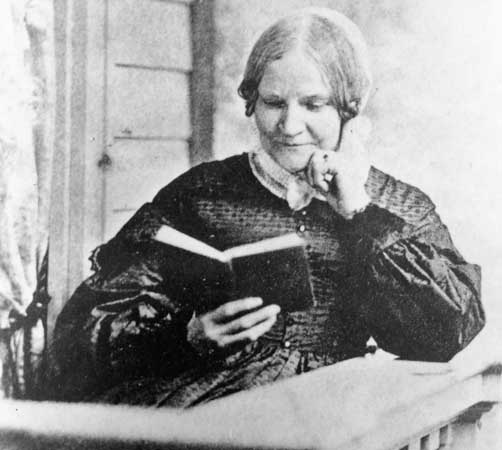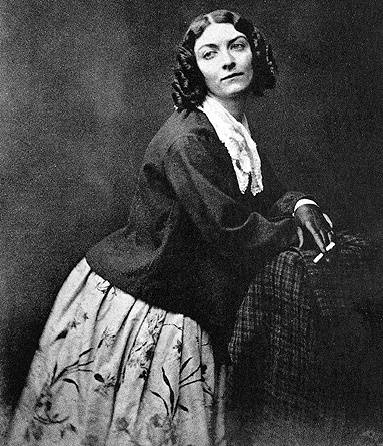 Smoochies.
Smoochies.
I lived a past life in the year 1848. My love of history began as a “costumed interpreter” in a large, outdoor living history museum in Ohio. We were in character five days a week, eight hours a day, hosting paying visitors in a large house. I had a group of people cast as my family–who are still some of my closest friends–and my experiences working there in my teens changed my life and set me on my career path.
The most surreal part of the experience was that the role of my mother was played by my actual mother.
My mother is an incredible woman. A force of nature. But working with one’s mother at the age of 16 is rough, to say the least. We managed.
One of her “bits” for the visitors was to pull out her copy of The American Frugal Housewife by Lydia Maria Child; published in 1833, it was one of the most popular recipe and advice books of the early 19th century.
“Open it!” my mother would dramatically command of our guests, “And you will see that my copy falls open to the page on the ‘Education of Daughters.”
 Mrs. Child. Also an abolitionist. Awesome lady.
Mrs. Child. Also an abolitionist. Awesome lady.
Mom’s copy is now in my possession, and it has in fact been opened so many times that the spine is broken at this section. Whenever Mother would say her line I would roll my eyes, both in character and out. But the other day, I pulled Mrs. Child off the shelf because I had actually never read what she had to say on the education of daughters. One of her first pieces of advice really surprised me:
“The greatest and most universal error is, teaching girls to exaggerate the importance of getting married; and of course to place an undue importance upon the polite attentions of gentlemen…That a mother should wish to see her daughters happily married, is natural and proper; that a lady should be pleased with polite attentions is likewise natural and innocent; but this undue anxiety, this foolish excitement about showing off the attentions of somebody, no matter whom, is attended with consequences seriously injurious. It promotes envy and rivalship; it leads out young girls to spend their time between the public streets, the ball rooms, and the toilet; and worst of all, it leads them to contract engagements, without any knowledge of their own hearts, merely for the sake of being married as soon as their companions.”
I was astounded at how modern this idea was, put down on paper over 180 years ago. It reminded me of the 2013 TEDtalk by author Chimamanda Ngozi Adichie, famously sampled on Beyonce’s album. Adichie says “Because I am a female, I am expected to aspire to marriage. I am expected to make my choices always keeping in mind that marriage is the most important. Marriage can be… a source of joy and love and mutual support. But why do we teach girls to aspire to marriage and we don’t teach boys the same?”
Another women writer and contemporary of Mrs. Child tackles courtship and marriage more subversively. Lola Montez is one of my favorite women ever. Born in Ireland with a different name, she became a dancer and toured Europe. I suspect she wasn’t a great technical dancer, but a captivating one. She slept with a lot of hot guys, was involved in a revolution in Bavaria, came to America then toured, lectured, and wrote to support herself. She was smart, sexy and independent in a time when that was very much out of the mainstream.  She’s buried in Green-Wood cemetery, in Brooklyn, and I stop by to say hi sometimes.
 Lola Montez, photographed in New York. Also, the first known image of a woman smoking a cigarette. I thought that was so bad-ass when I was 16.
Lola Montez, photographed in New York. Also, the first known image of a woman smoking a cigarette. I thought that was so bad-ass when I was 16.
While living in New York in 1858, Montez published The Arts and Secrets of Beauty, a book that’s a bit like a wittier Cosmo magazine. In one passage, she quotes a “classical synopsis” of the ideal female beauty: a well rounded head, white skin, fine fingers, wide hips and many more rigid guidelines. She then adds, with mirth, “It is very fortunate, however, for the human race that all men do not have exactly a correct taste in the matter of female beauty.”
The back of the book is the best part, however: “Hints to Gentleman on the Art of Fascinating.” She introduces this section as a guide to men on how to win the hearts of women. But it’s done with a wink, because what follows is a description of men on their worst behavior. Anyone who has ever been on a date can relate and commiserate, even 160 years later. A few of her “rules,” below:
RULE THE SECOND You will make an immense hit with the ladies by pretending to be no admirer of any particular woman, but a professed adorer and slave of the whole sex; a thing which you can easily show by staring insultingly at every pretty woman you meet.
RULE THE SIXTH Women like men of courage, therefore you should entertain the lady you would win with a narration of the number of men you have knocked down, at balls and bar-rooms, who had the temerity to cross your path. Be sure that you always make yourself the hero of some scrape.
RULE THE SEVENTH Let your compliments be so marked a character that there can be no mistaking them. For instance, you may ask her if she is always particular to shut her eyes on retiring to bed? She will ask why? And you will answer, Because if you do not, I fear the the brightness of your eyes will burn holes in the blankets, or set the house afire!
Pick up lines. In 1858. That’s fucking hilarious. They only get funnier, and I wish I could reproduce everything single one here. But the whole book is online here. Get on over and read all 50 rules, you won’t regret it.
Ok, one more here:
RULE THE FIFTEENTH  One of the most direct and sure ways to fascinate a lady, is to excite in her heart a spirit of rivalry, through jealousy. A common way of doing this is to get the daguerreotypes of your father’s cook and chambermaid and take them to your lady-love, and tell her that they are the likeness of two very rich and highly respectable ladies who have for a long time persecuted you with their affections, and at last have the indelicacy to send you their pictures, without any solicitations on your part whatsoever…It will  certainly convince any lady that you are a prize worth having, especially if she foresees that she would have the pleasure of having her home filled with a cabinet of strange women’s faces, which she could exhibit as the proud savage does the scalps her husband has taken from the heads of his enemies.

0 Responses to “The Surprisingly Modern Advice to Women (And Opinions on Men) of Two 19th Century Writers”